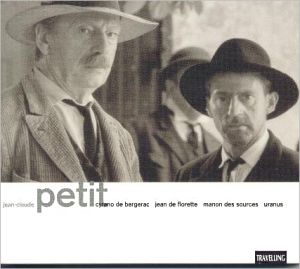************************************************************** EDITOR’s CHOICE July 2002 **************************************************************
Jean-Claude PETIT
Film music Cyrano de Bergerac; Jean de florette; Manon des sources; Uranus; Deux; Fucking Ferdinand
OSTs
TRAVELLING NAÏVE K1604 [49:14]

The collection commences with Petit's Academy Award nominated score for the 1990 French version of Cyrano de Bergerac with Gérard Depardieu brilliantly cast as the long-nosed poet, shy but hot-tempered and a brilliant swordsman. Three short excerpts include the poetic, romantic 'Closing Titles' music full of pathos, and thwarted romance before the music becomes proud and strident to speak of Cyrano's defiance and heroics. 'Les Lustres' is elegant music for the gathering of gentlemen and actors in the theatre at the beginning of the film while 'La Lanterne Magique' is an amusing and colourful evocation 'mickey-mousing' the magic lantern show, rather like an 18th century hurdy-gurdy, as the crowds press into the theatre.
Also celebrated is the music Petit wrote for Jean de Florette and its sequel Manon des Sources. For the former, we hear the main themes including the unforgettable mournful harmonica theme based on Verdi's La Forza del Destino. But beyond this Petit's music perfectly captures the sun-drenched, parched landscape of Provence and the brooding claustrophobic atmosphere of Claude Berris's tragic masterpieces. The Manon des Sources music has figures full of grotesque irony for the hapless Ugolin, the ugly, luckless victim of Manon's revenge. But the music also has the shimmer of sun on water and a sympathetic voice of pathos.
An unusual voice, an oddly muted trumpet, almost is used almost tongue-in-cheek mockingly to counter the heroic music for Le retour des mousquetaires. This is a fun score – exciting thrusting and, extraordinarily, in part, sporting heroic figures sounding quite Elgarian. And Petit's period pastiche music goes with a real swing – Jordi Savall eat your heart out!
More complex is the intensely emotional 'Main Titles' music epitomising Lady Chatterley's craving for love. Her yearning is palpable.
Uranus (1990) is set in a small French provincial town just after the War and involves a former collaborator now sought by Communist activists. Petit uses a small chamber group for the introspective 'Main Titles' while expanded forces underscore 'Dire qu'il a fallu' for music that is clearly umpah-umpah farcical.
Deux (1988) is spellbinding and clearly struck a chord for Petit. The film is about a composer and concert organiser who wishes to buy the house his master used to occupy in Montmartre. The music seems to imply that the house is haunted but that the spirits are friendly. This spectral, lovely music, beautifully lyrical is worth the price of the album alone. One of those scores that stick in one's mind long after the last bar has sounded.
The peculiarly, if not alarmingly, named Fucking Fernand (1987) is a film about the incredible adventures of Fernand who is fabulously rich but blind and has been committed to a mental institution and Antoine a butcher who has been sentenced to prison for life – both of them are liberated when the city is bombed. Petit's score features a solo piano at the beginning as though extemporising. The music meanders forward disconsolately, seemingly aimlessly through the Main Titles before we experience a complete change of mood and we are thrust into a bizarre sort of landscape usually associated with Danny Elfman - hurdy gurdy fairground music with spoons. An old-fashioned, very French style song, 'Non, non Monsieur' brings this score and an outstanding album covering a wide variety of styles to an amiable conclusion.
For the adventurous, whole-heartedly recommended.
Ian Lace

Return to Index